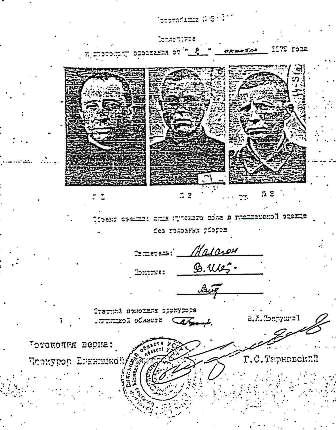Holocaust Education & Archive Research Team |
Aktion Reinhard A-R Leadership
A-R Articles
Action Erntefest Modern Research
| ||
Nikolay Malagon – Interrogation Statement
18 March 1978 City of Zaporozh’ye
Justice Litwinenko – Senior Investigator of the Procuratorate of the Zaporozh’ye Region.
Witness – Nikolay, Petrovich Malagon
Born 1919 native and resident of the village of Novo- Petrovka, Berdyansk District, Zaporozh’ye Region.
Citizen of USSR , Ukrainian manual worker, married. The interrogation started at 3.30am. Before the interrogation started the witness declared that he knows the Russian language well and wishes to testify in Russian.
The witness gave the following elucidations to the questions asked; In February 1941 I was called up for active service in the Soviet Army by the Berdyansk district military committee.
When the Great Patriotic war began I was with my unit in the Cherkassy city area and subsequently we were transferred to the Kiev city area, where I took part in the defence of the capital of the Ukraine.
In August 1941, in the area of the village of Borshchigovka, I was wounded in the head and together with other soldiers of our unit fell a prisoner to the Germans.
At first I was held in the Prisoner of War camp in the city of Zhitomir, then was transferred to a camp in the city of Rovno. A day later we were loaded into railroad cars and transferred to the Prisoners of War camp near the city of Chelm on Polish territory.
About two months after our arrival, about October – November 1941we were aligned near the barracks and a man in civilian clothes, who he was I do not know, but he had no stripes on his sleeves, started to pick out prisoners to be sent to work projects.
At that time he did not tell us where precisely and what type of work would have to be done by the prisoners selected. This man selected in all about 60-70 men from among the prisoners at his discretion and we were transported in three trucks to the camp of Trawniki.
In the Trawniki camp, four companies consisting of prisoners of war were formed, with about 100 men in each, but I do not remember the exact number at present. Three companies consisted of prisoners of war of Ukrainian nationality, one of young Russians.
The commanders of these squads were Germans residing on USSR territory and then made prisoners. I was in the third company, the commander of which was Mayevskiy. I don’t recall his first name and patronymic. Most probably he was a Pole, because he spoke Polish well.
The Commander of our squad was Brovt, I do not remember his first name and patronymic – he was a teacher by profession and lived before the war in the Volga area.
The Commanders of the other companies were likewise Germans. In the Trawniki camp it was explained to us that we were to be trained for service in the German army to guard camps. Two or three weeks after their arrival at Trawniki camp all four companies of prisoners of war gave a pledge of loyalty. A German officer read the text of the pledge, a translator translated and then each prisoner signed his name under the text of the pledge and left a finger- print.
The pledge said something like the following:
“ We prisoners of war enter voluntarily into the German SS troops and will defend the interests of Greater Germany”. Then we learned that we were to be trained to become Wachmann’s, i.e guards or sentries.
At first we wore our own clothing, then we were given the uniform of Belgian soldiers, a sometime later we were all given special uniforms: A black suit – trousers and jackets, a black overcoat with grey collars and cuffs and black forage caps.
We were also given buttons on which was engraved a skull and crossed bones. These buttons were sewn onto the cap. In the camp we were trained by the company commanders – we were mostly engaged in drill exercises. We walked about the streets, sang German songs and at the same time were given military drill training.
We did not attend shooting practice. We were not given weapons during training, but during this time we studied the parts of a German rifle.
Source:
Documentation provided by the Holocaust Historical Society USDC, Protocol, 00893, Malagon, 18 March 1978.
Copyright SJ H.E.A.R.T 2007
|
